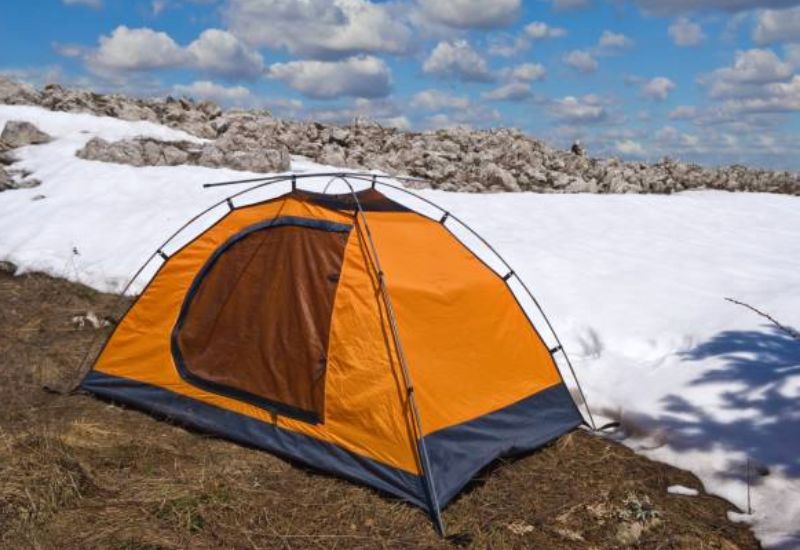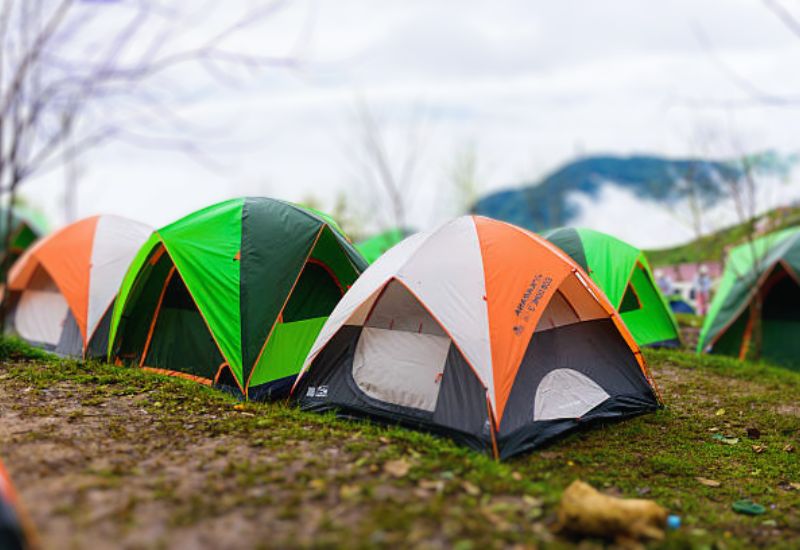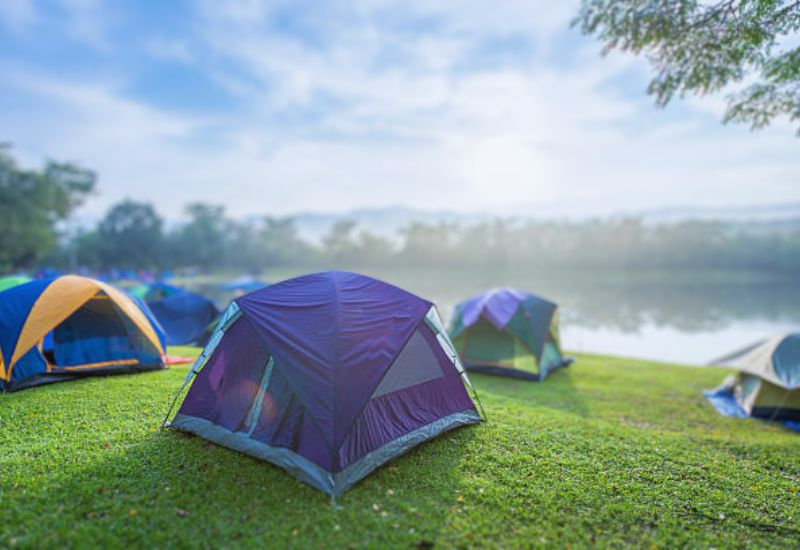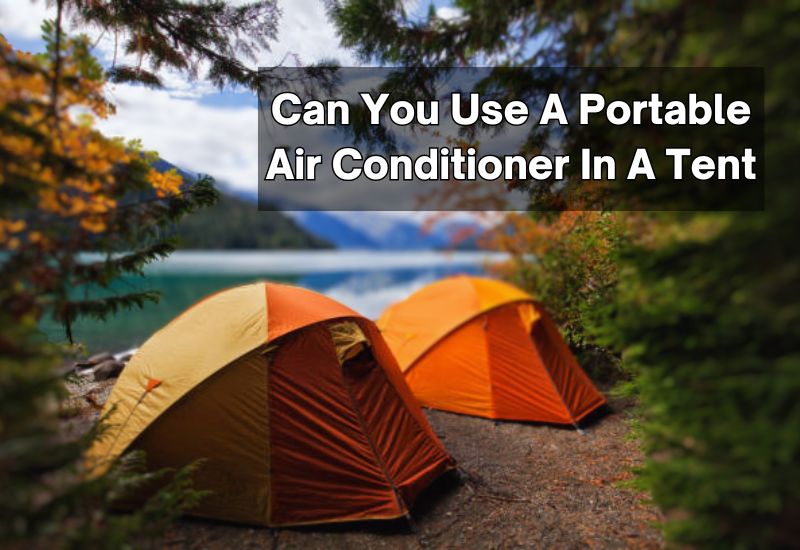Using a portable air conditioner in a tent can greatly enhance your camping experience, especially during hot summer months. While camping, maintaining a comfortable temperature is crucial for a good night’s sleep.
Can You Use A Portable Air Conditioner In A Tent? Yes, you can use a portable air conditioner in a tent. Ensure proper ventilation and choose an AC unit that matches your tent size. Portable ACs need a power source, so consider your campsite’s electricity options. This setup enhances comfort, making your camping trip more enjoyable.
In this guide, we’ll explore the feasibility, benefits, and practical tips for using a portable air conditioner in a tent, ensuring you stay cool and comfortable.
Can You Use Portable AC?
What is a Portable AC?
A portable air conditioner is a versatile cooling device that can be moved from room to room.
Unlike traditional AC units, they don’t require permanent installation, making them perfect for renters or those who frequently change residences.
Benefits of Using Portable AC:
Portable air conditioners offer several advantages:
- Mobility: Easy to move from one place to another.
- Cost-Effective: Typically less expensive than central air systems.
- Easy Installation: No need for complex installation processes.
Is Your Tent Compatible with Portable AC?
Before you bring a portable AC on your camping trip, ensure your tent can handle it:
- Ventilation: The tent must have proper ventilation for the AC exhaust.
- Size: Ensure the AC unit fits comfortably inside the tent.
- Power Supply: Check if the campsite provides power or if you need a power inverter.
Power Requirements for Portable AC:
Portable air conditioners have specific power requirements:
- Voltage: Ensure your power source matches the AC’s voltage needs.
- Inverter: If using in a tent, a power inverter might be necessary.
- Output: Verify the AC’s cooling capacity (measured in BTUs) matches your space.
Enhancing Camping Comfort:
Using a portable AC in a tent can make your camping experience much more enjoyable:
- Beat the Heat: Stay cool during hot summer nights.
- Sleep Quality: Improved sleep without the discomfort of heat.
- Health Benefits: Reduce the risk of heat-related illnesses.
Tips for Efficient Use of Portable AC:
To maximize the efficiency of your portable air conditioner:
- Close Windows and Doors: Keep cool air inside.
- Regular Maintenance: Clean filters and check for blockages.
- Optimal Placement: Place the AC near a power source and ventilation area.
Benefits of Tent Air Conditioners

Keeps the Tent Cool in Hot Weather:
One of the main benefits of tent air conditioners is their ability to keep the tent cool during hot weather.
This can be especially important during summer camping trips when the temperature inside a tent can become uncomfortably high. Staying cool helps you enjoy your trip more and avoid heat-related issues.
Reduces Humidity and Prevents Mold Growth:
Another significant advantage is that tent air conditioners reduce humidity levels inside the tent.
Lower humidity prevents the growth of mold and mildew, which can cause health issues and damage your camping gear. A dry environment also makes your tent feel more comfortable.
Improves Sleep Quality:
A good night’s sleep is crucial when camping. Tent air conditioners help improve sleep quality by maintaining a comfortable temperature and reducing noise from outside.
With a cooler and quieter tent, you’re likely to sleep better and wake up refreshed for the day’s adventures.
Easy to Use and Portable:
- Portable and Lightweight: Most tent air conditioners are designed to be portable and easy to carry, making them perfect for camping trips.
- Simple Setup: These units are typically easy to set up and operate, requiring minimal effort to start cooling your tent.
- Versatile Power Options: Many models can run on batteries, car power, or even solar panels, offering flexibility in how you use them.
Cost-Effective Cooling Solution:
Compared to other cooling methods, tent air conditioners are a cost-effective solution. They provide targeted cooling where you need it the most, without wasting energy.
Investing in a tent air conditioner can save money in the long run by reducing the need for other expensive cooling options.
Enhances Overall Camping Experience:
- Comfortable Environment: With a tent air conditioner, you can maintain a comfortable environment, no matter the weather conditions outside.
- Extended Camping Season: By keeping your tent cool, you can extend your camping season into hotter months without discomfort.
- Better Enjoyment: Enjoy your camping activities more without worrying about the heat or humidity affecting your plans.
Choosing the Right AC Unit

How to Choose the Right AC Unit for Your Tent?
Choosing the right AC unit for your tent is crucial for comfort during camping trips. Here are some important points to consider to ensure you select the best unit for your needs.
Determine the Tent Size:
Match the AC Unit Size to Your Tent Size:
- Measure Your Tent: Ensure you know the dimensions of your tent before purchasing an AC unit.
- Consider the Shape: Tents with unique shapes might require different AC placements for optimal cooling.
Importance of Proper Size Matching:
A properly sized AC unit ensures efficient cooling without overworking the device. A small unit for a large tent will struggle to cool, while an oversized unit might waste energy.
Check the BTU Rating:
What is BTU and Why It Matters?
- BTU Defined: BTU stands for British Thermal Unit, which measures the cooling capacity.
- Proper Rating: A 5,000 BTU AC unit is ideal for small to medium tents, ensuring efficient cooling.
Match BTU to Tent Size:
Ensure the BTU rating is suitable for your tent size. A higher BTU rating might be necessary for larger tents or extremely hot conditions.
Consider the Power Source:
Types of Power Sources:
- Battery-Powered: Convenient but might need frequent recharging.
- Generator: Reliable but can be noisy and require fuel.
- Solar-Powered: Eco-friendly but dependent on sunlight availability.
Power Source and Portability:
Select an AC unit that matches your power source availability and portability needs. Battery-powered units are great for short trips, while generators are better for extended stays.
Evaluate Portability:
Importance of a Portable AC Unit:
A portable AC unit ensures you can easily transport it to different camping sites. Look for units with handles or wheels for added convenience.
Features to Look For:
- Compact Size: Easier to pack and transport.
- Lightweight Design: Less strain when moving the unit.
Assess Additional Features:
Modern Conveniences:
- Remote Control: Adjust settings without leaving your tent.
- Thermostat: Maintain a consistent temperature easily.
Extra Features and Their Benefits:
Features like dehumidifiers can enhance comfort by reducing humidity levels inside the tent, making the environment more pleasant.
Compare Costs and Reviews:
Budget Considerations:
- Initial Cost: Consider your budget and the initial cost of the AC unit.
- Operating Costs: Factor in electricity or fuel costs for running the unit.
Importance of Reviews:
Read user reviews to understand the performance and reliability of different AC units. Reviews can provide insights into potential issues or benefits.
Make the Final Decision:
Weighing All Factors:
Consider all the above factors before making your final decision. The right AC unit will balance size, BTU rating, power source, portability, and additional features to meet your specific needs.
Example Recommendation:
A 5,000 BTU portable air conditioner is suitable for small to medium-sized tents, ensuring efficient cooling without overloading power sources. This balance makes it a popular choice among campers.
Safety Tips for Using AC

Choose the Right AC for Your Space:
Selecting the correct size and type of AC for your tent or outdoor space is crucial. A unit too powerful can lead to overheating, while an underpowered one won’t cool effectively.
- Measure the space to determine the required BTU (British Thermal Unit) rating.
- Look for AC units specifically designed for outdoor use.
Ensure Proper Ventilation:
Proper ventilation is vital to prevent overheating and maintain air quality.
- Always place the AC in a well-ventilated area.
- Ensure that exhaust vents are not blocked.
- Use ventilation accessories provided with the unit.
Use Outdoor-Rated Electrical Equipment:
Using the right electrical equipment can prevent accidents and ensure safe operation.
- Choose extension cords rated for outdoor use.
- Ensure all plugs and outlets are dry and undamaged.
- Avoid using damaged or frayed cords.
Regular Maintenance is Key:
Regular maintenance of your AC unit can prevent breakdowns and extend its lifespan.
- Clean or replace filters monthly.
- Inspect and clean the condenser coils regularly.
- Check for any leaks or unusual noises.
Monitor Temperature and Humidity Levels:
Keeping an eye on the temperature and humidity can help maintain a comfortable and safe environment.
- Use a thermometer and hygrometer to monitor conditions.
- Adjust the AC settings to maintain a balanced temperature.
Follow Manufacturer’s Instructions:
Always follow the manufacturer’s instructions for installation, use, and maintenance.
- Read the manual thoroughly before setting up the AC.
- Adhere to all safety warnings and guidelines provided.
Conclusion
Using a portable air conditioner in your tent can significantly improve your camping experience, especially during hot summer months.
It ensures a comfortable temperature, allowing you to sleep well and enjoy your trip. Just make sure your tent is compatible with the AC unit, has proper ventilation, and a suitable power source.
This setup will keep you cool and comfortable, making your camping adventures more enjoyable.
FAQ’s (Can You Use A Portable Air Conditioner In A Tent)
Does portable AC work in a tent?
Yes, a portable AC can work in a tent, provided it has proper ventilation and a power source.
Ensure the AC unit matches the tent size and can efficiently cool the space. This setup enhances comfort during hot weather camping, making your experience more enjoyable.
Is it safe to sleep with a portable air conditioner on?
Yes, it is generally safe to sleep with a portable air conditioner on.
Ensure proper ventilation to avoid carbon monoxide buildup and follow the manufacturer’s safety guidelines. Regularly maintain the unit and ensure it’s in good working condition to enjoy a cool and safe night’s sleep.
What size AC do I need for a tent?
The size of the AC unit needed for a tent depends on the tent’s size.
Typically, a 5,000 BTU portable air conditioner is sufficient for small to medium-sized tents. Ensure the AC’s cooling capacity matches the tent’s dimensions for efficient temperature control and comfort.
Is there a way to air condition a tent?
Yes, you can air condition a tent using a portable air conditioner.
Ensure the tent has proper ventilation for the AC’s exhaust and an adequate power source. Additionally, choose an AC unit suitable for your tent size to effectively manage the temperature and enhance comfort.
How can I cool my tent without AC?
Cool your tent by choosing a shaded spot, using reflective tarps, and ensuring proper ventilation.
Keep the tent flaps open and use battery-operated fans to circulate air. Avoid direct sunlight during peak hours.
How to keep a tent cool in summer?
To keep your tent cool in summer, set up in the shade, use a reflective tarp, and open vents for airflow.
Employ battery-powered fans and stay hydrated. Avoid heat buildup by pitching your tent away from direct sunlight.








